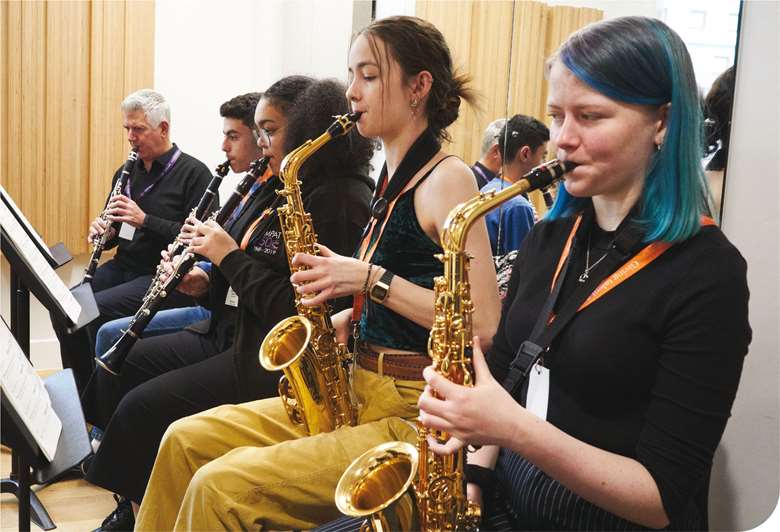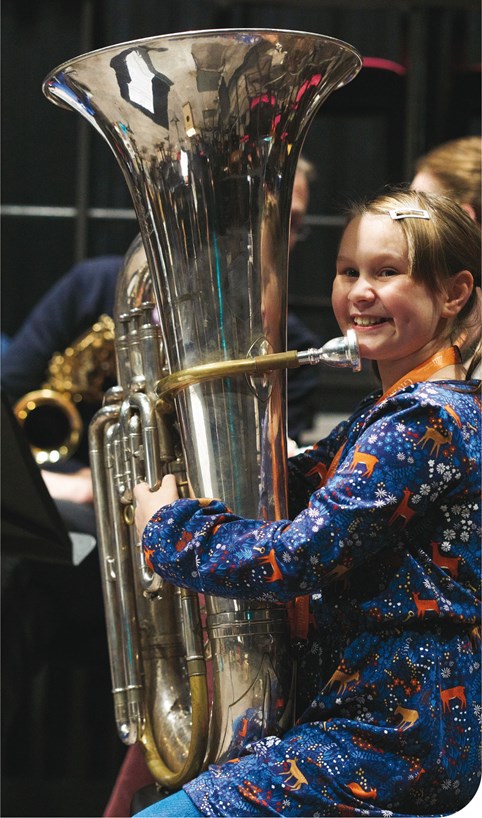Lockdown lifeline: Awards for Young Musicians
Clarissa Payne
Sunday, November 1, 2020
Awards for Young Musicians’ chief executive Hester Cockcroft tells Clarissa Payne how the charity's work has become more important than ever.

In its 20-year history, Awards for Young Musicians (AYM) has supported thousands of young musicians from lower-income backgrounds. In response to the challenges of Covid-19, AYM offered awards to more young musicians than ever before, after receiving a record-breaking number of eligible applications.
‘We know the need is huge and is only going to become more so as family incomes get tighter and tighter over the next couple of years,’ says Hester Cockcroft, AYM's chief executive.
‘Our priorities are to help children at the most basic level to keep on playing, and obviously money is vital to that. If they haven't got the money to continue to develop their instrumental playing or their music production, they can't do anything.’
AYM helps young musicians to overcome barriers to music-making, and awards have been used to purchase instruments or equipment, pay for tuition and cover transport to rehearsals and courses.
Lockdown presented two huge problems: increased financial uncertainty for the young musicians and their families – the average family income of 2020's award winners is under £17,000 – and of course the impossibility of actually getting together to make music. Even now that some limited musical activities have restarted, transport can be a problem.
‘There are anxieties around safety for many families. If they don't have a car, not only do they have to pay to get somewhere, but they also have the concern of being on public transport and what impact that might have on family health.’
A place to practise is more important than ever, but with so many people now working from home, it can be tricky. ‘We regularly get asked through the awards programme for soundproofing – and things like electronic drum kits really make a difference,’ says Cockcroft.

She feels keenly the loss of the AYM events where young musicians get together. ‘That buzz of making music together and being in a packed room – parents and grannies and siblings and everybody piled in together, that kind of wonderful musical community that performances create – I don't think you can reproduce that online’.
That hasn't stopped AYM creating online opportunities for their award holders. Conductor Alpesh Chauhan and violinist Thomas Gould, both AYM patrons, have run sessions. ‘Alpesh took us through some of his favourite excerpts with his own markings, which was an amazing insight. He talked about the life of a conductor and what it involved.’
The violinists reported that the classes with Gould ‘kept them sane musically,’ says Cockcroft. ‘Having that momentum, knowing that there's a session coming up with Tom, they've got a piece that they're going to be working on with him, with others observing – it's so important.’
Young violinist and award-holder Katie agrees. ‘I, like most others, have struggled with the lockdown as many orchestras and groups have been cancelled or postponed. Finding an aim for practice is difficult.’ Katie's father noticed the dramatic difference the online masterclasses made. ‘Some days she is feeling low and trapped, then when preparing for a session with AYM, Katie is smiling and full of life again.’
AYM doesn't just work with classical instrumentalists, it has been supporting young people who compose or produce music over the last decade. Part of their Covid response has been to increase this commitment, and 14 young people working in music production have received awards this year.
‘One young man sent us an incredibly slick and sophisticated techno track as his audition – perfect to be played in a club back in the pre-Covid days,’ says Cockcroft. ‘We're going to help him get a new Mac – he was really struggling on a fairly cruddy PC and had still created this fantastic piece of music. When he has a new Mac I think what he'll be able to do should be pretty phenomenal.’
AYM aims to provide a pipeline for musical talent, and, as well as offering awards, runs programmes aimed at young people earlier in their musical progression. Mentoring is a big part of this, with award holders mentoring younger children and former award holders becoming patrons who share their knowledge and experience.
If it weren't for Covid, this would be the second year of AYM's Talent to Talent programme.
‘[Saxophonist] Jess Gillam was one of the mentors on the first phase. Now she's one of our patrons and is developing a stellar career having been supported by us throughout her teens,’ said Cockcroft.
Gillam shares Cockcroft's concerns, saying that, ‘One of the most inspiring and enlightening experiences for me as a child learning music was meeting and learning from like-minded young people and, at the moment, young people do not have the opportunity to experience the physicality of making music together, which is extremely difficult.’
‘I fear some young learners may lose interest, motivation or passion for music. For me, music is all about people; it is part of the fabric of our society and sits at the heart of the human experience. I believe every child has the right to experience the benefits of the immeasurable entity we label “music” and to learn from its magic.’
AYM's class of 2020 faces unprecedented challenges, but the charity is behind them all the way.
‘I use the phrase “bespoke support” a lot,’ says Cockcroft. ‘We listen to the young people, find out what they need and make sure we are focused on each individual.’

